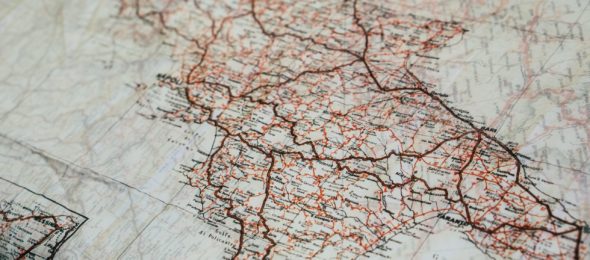We are pleased to announce “Under-Mapped Spaces: New Methods and Tools for Critical Storytelling with Maps,” an intensive, student-designed workshop for emerging scholars. The workshop will be held from February 28-March 4, 2022 at Stanford University, and is co-hosted by the David Rumsey Map Center and Stanford Geospatial Center, and Branner Earth Sciences Library and Map Collections.
Cartography continues to reproduce and amplify global inequalities in the production of knowledge. Drawing on Stanford’s rich map collections, this initiative aims to apply cutting-edge digital tools to the creation of compelling, accessible, and ethical narratives about “under-mapped” spaces.
Graduate student applicants may want to consider one or more of the following questions as a point of departure:
- How have racism, sexism, economic exploitation, and imperialism contributed to the privileging of certain cartographies over others? What are the consequences of this for knowledge production?
- How have the cartographic contributions of indigenous populations and the economically marginalized been collected and examined? How do the legacies of this appropriation affect our understanding of the history of places today?
- How have the past half-century of technological innovations and the accessibility of maps affected cartographic production? In an age of surveillance, what is underexplored?
- How have imagined cartographies conditioned the ways that people think about places? How have these fantastical expectations shaped cartographic practices and historical outcomes?
- How can ephemeral lived experience–seasons, migrations, populations—be mapped? Can map design improve our ability to recognize emergence, lifetimes, and loss?
Participants will select a historical map from the Stanford collections linked to their own area of research. The five-day workshop presents an opportunity to use that map to reexamine the politics of cartography, develop new digital skills (ArcGIS, Leaflet, Wax), and explore innovative ways to incorporate critical storytelling with maps for classroom and public audiences. Sessions will include hands-on digital workshops on multiple platforms, public lectures, coworking sessions, and seminar-style discussions that engage the ethical questions underlying our work. Following the workshop, participants’ projects will be made available to the public in a digital exhibit, fostering an ongoing, inclusive dialogue around whose stories we tell with maps and how we tell them.
Please submit your application via this form by November 12, 2021. Your submission will include:
- Name
- Email contact
- Institutional affiliation
- Project title
- A proposal (300-500 words) explaining your current research, its engagement with “under-mapped spaces,” and how it would benefit from the application of digital cartographic tools and methods
- The link to a map of your choice from the Rumsey or Branner collections and a brief description of its relevance to your research area. Note that many maps have not yet been digitized. If you are having difficulty identifying maps in your area of interest, please reach out to Andria Olson at Branner Library or G. Salim Mohammed at the David Rumsey Map Center.
- A brief description of any prior experience with digital humanities tools and/or skills you would like to build
Participants without institutional funding for travel and accommodation, and those without prior training in digital humanities, are encouraged to apply.
If you have any questions, please contact the workshop organizers at the workshop email address.
“Under-Mapped Spaces” is made possible by generous support from the McCoy Family Foundation, Stanford Libraries, the Stanford Office of the Provost, and Stanford University History Department
Workshop organizers: Riley Brett-Roche (Stanford University), Kelsey Utne (Cornell University), Chloe Bordewich (Harvard University)








